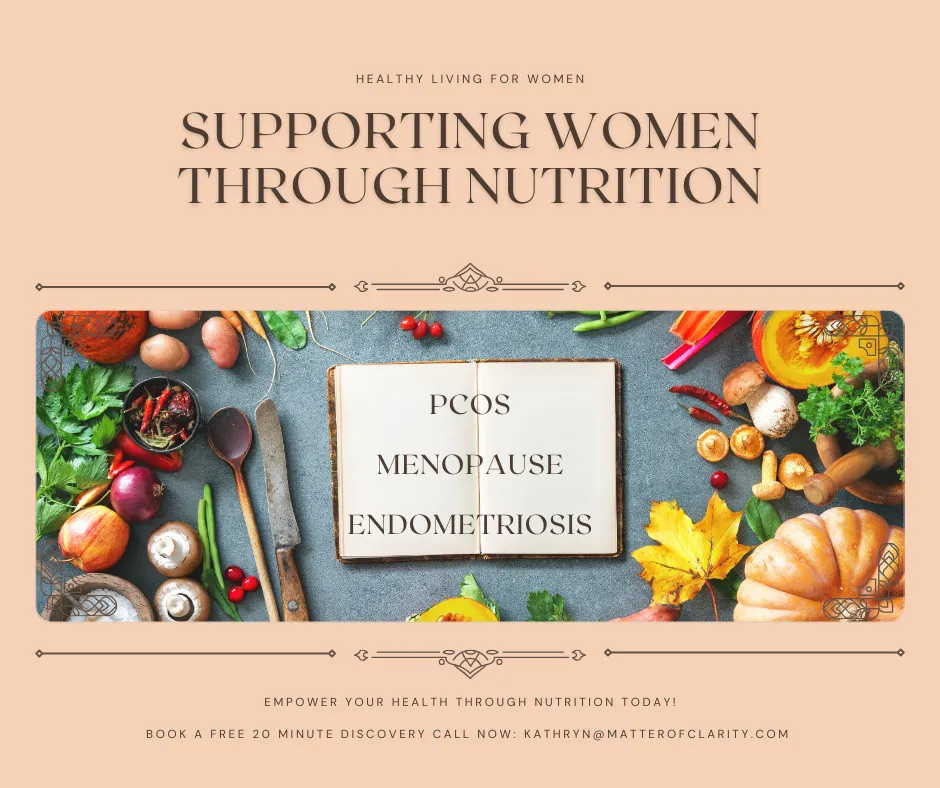Wisdom, Wellness and Womanhood
Welcome to the Matter of Clarity blog - your space for inspiration, support and grounded guidance.
Here I share honest reflections, holistic health tips and empowering resources to help you make sense of your body, mind and emotions at every stage of life
From navigating perimenopause to reclaiming rest, you'll find thoughtful content designed to educate, encourage and connect.

Minerals & Vitamins in Menopause
Introduction
Perimenopause and menopause are significant life stages that bring about various hormonal shifts, often leading to symptoms like fatigue, mood swings, brain fog, and bone density loss. While lifestyle factors such as exercise, sleep, and stress management play crucial roles in navigating these changes, nutrition—particularly vitamins and minerals—can be a game-changer in maintaining optimal health during this time.
In this monthly series, we’ll explore essential vitamins and minerals that can support your body during perimenopause and menopause, helping to ease symptoms and promote overall well-being. Let’s start by understanding why nutrition matters in this phase and highlight a few key nutrients to focus on.
Why Nutrients Matter in Menopause
As oestrogen levels fluctuate and decline, several bodily functions are impacted, including bone health, metabolism, mood regulation, and cardiovascular health. Specific vitamins and minerals can help mitigate these effects by:
Supporting bone strength and reducing osteoporosis risk
Enhancing energy levels and brain function
Balancing mood and improving sleep quality
Reducing inflammation and supporting heart health
Here are some of the most important vitamins and minerals to focus on during this stage of life:
1. Magnesium – The Menopause Miracle Mineral
Magnesium is often overlooked, yet it plays a critical role in over 300 biochemical reactions in the body. During menopause, magnesium can help:
Improve sleep quality and relaxation
Reduce anxiety and irritability
Ease muscle cramps and headaches
Support bone health alongside calcium and vitamin D
Best sources: Leafy greens (spinach, kale), nuts and seeds (almonds, pumpkin seeds), dark chocolate, and whole grains. If supplementing, opt for magnesium glycinate for better absorption.
2. Vitamin D – The Sunshine Vitamin
Vitamin D is crucial for calcium absorption and bone health. Low levels can contribute to an increased risk of osteoporosis and mood disorders.
Supports bone density and reduces fracture risk
Helps regulate mood and combat depression
Strengthens the immune system
Best sources: Sun exposure, fatty fish (salmon, mackerel), plant-based milks, and eggs. Many women benefit from supplementation, especially in winter months.
3. Calcium – Essential for Bone Health
As oestrogen declines, bone density decreases, making calcium intake even more important.
Prevents bone loss and reduces osteoporosis risk
Supports nerve function and muscle contraction
Best sources: Dairy products, leafy greens (spinach, kale), tofu and almonds. It’s best absorbed with vitamin D and magnesium.
4. B Vitamins – Energy & Brain Boosters
B vitamins, especially B6 and B12, are vital for energy production, brain health, and red blood cell formation.
Helps reduce fatigue and brain fog
Supports nervous system function and mental clarity
Balances mood and reduces the risk of depression
Best sources: Whole grains, eggs, meat, fish, legumes, and dark leafy greens. Many women may need B12 supplements, especially if following a plant-based diet.
5. Omega-3 Fatty Acids – Anti-Inflammatory Powerhouse
Omega-3s are essential for heart and brain health and can help ease menopause symptoms.
Supports cognitive function and memory
Reduces inflammation and joint pain
Aids in heart health and balances cholesterol levels
Best sources: Fatty fish (salmon, sardines, mackerel), flaxseeds, chia seeds, walnuts, and algae-based supplements for plant-based options.
Final Thoughts
Menopause is a transformative time, and the right nutrition can make a significant difference in how you feel. Prioritising key vitamins and minerals can help support your body’s changing needs, reduce uncomfortable symptoms, and improve overall well-being.
Stay tuned for next month’s blog, where we’ll dive deeper into Magnesium – The Menopause Miracle Mineral and explore how it can be a game-changer for sleep, stress, and bone health.
Do you have any questions or experiences with menopause nutrition? I’d love to hear from you in the comments!
About the Author:
Kathryn Evans is a qualified nutritionist and menopause wellness coach passionate about helping women navigate midlife with confidence and vitality. Follow this blog for more insights on holistic health, nutrition, and lifestyle tips for a vibrant menopause journey.
Disclaimer: This blog is for informational purposes only and is not intended to replace professional medical advice, diagnosis, or treatment. Always consult with your GP or a healthcare professional before making any changes to your diet, lifestyle, or supplement routine, especially if you have underlying health conditions or are taking medication.

FREE DOWNLOAD
Transform your Journey
Let's create a life filled with vitality, balance and joy through holistic wellness and self-care
© Copyright 2025 Matter of Clarity - Privacy Policy - Terms & Conditions
